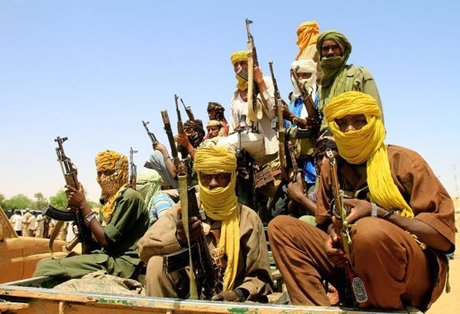Darfur Rebels Say 49 AU-U.N. Peacekeepers Freed
إقرأ هذا الخبر بالعربية
Rebels in Sudan's Darfur region said on Monday they had freed all 49 international peacekeepers captured one day earlier but that they continued to hold three Sudanese.
"We released the peacekeepers because our investigation confirmed that they came to our area without knowing it is under our control," Gibril Adam Bilal, spokesman for the rebel Justice and Equality Movement (JEM), told Agence France Presse.
He said the movement still held the three Sudanese -- initially suspected to be government security agents -- while it verified what they were doing with the peacekeepers.
"If the investigation confirms that they are not security members we will release them immediately," he said.
A UNAMID public information officer said the three civilians work for the peacekeeping mission, not the government.
"They are not spies," she said, declining to say what had happened to them.
She gave the number of peacekeepers as 55 and said they are able to move but are "working on releasing" the civilians who were with them.
The troops had not been taken hostage, she said.
Bilal said earlier the U.N. troops had been captured while the rebels probed why they had entered a JEM-controlled area without permission and without informing the insurgents.
He said the peacekeepers and their equipment were safe. Forty-six of them were from Senegal, including two officers, while there was one each from Yemen, Ghana and Rwanda.
Senegalese troops operate primarily in Darfur's northwest near the Chad border.
UNAMID told the Sudan Armed Forces that the captives include 55 Senegalese soldiers and three African police, travelling in a convoy east of the West Darfur state capital of El Geneina, said army spokesman Sawarmi Khaled Saad.
"They were surrounded by troops from the Justice and Equality Movement in 20 vehicles, who asked them to give up their weapons," he said.
The JEM, a key rebel group from Darfur, announced in January that it had chosen Gibril Ibrahim, a one-time university professor, to head the movement after his brother Khalil, its former leader, was killed.
The new chief denied JEM had fractured and said the group would follow the course set by his brother to seek "democratic" change.
The JEM and other rebel groups drawn from Darfur's non-Arab tribes rose up against the Arab-dominated Khartoum government in 2003. In response, the government unleashed state-backed Janjaweed militia in a conflict that shocked the world and led to allegations of genocide.
Since then, much of the violence in the region has degenerated into banditry.
Early this month JEM released five Turks who, the group said, had been hired to dig wells for the Sudanese military. They were held for several months.
The United Nations estimates that at least 300,000 people have died as a result of the Darfur conflict, with about 300 killed in clashes last year. Almost two million people remain displaced.
The Sudanese government puts the death toll at 10,000.
Last year the government signed a peace deal in Doha with an alliance of Darfur rebel splinter factions. JEM and other key rebel groups refused to sign the pact, saying it failed to address the Darfur problem at its roots.
President Omar al-Bashir is wanted by The Hague-based International Criminal Court for alleged genocide, crimes against humanity and war crimes in Darfur.



